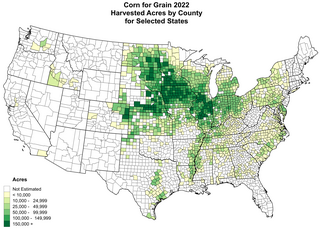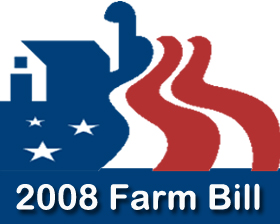Related Research Articles
Bunge Global SA (BUN-ghee) is a global agribusiness and food company, incorporated in Geneva, Switzerland and headquartered in St. Louis, Missouri, United States.

The soybean, soy bean, or soya bean is a species of legume native to East Asia, widely grown for its edible bean, which has numerous uses.
The Monsanto Company was an American agrochemical and agricultural biotechnology corporation founded in 1901 and headquartered in Creve Coeur, Missouri. Monsanto's best-known product is Roundup, a glyphosate-based herbicide, developed in the 1970s. Later, the company became a major producer of genetically engineered crops. In 2018, the company ranked 199th on the Fortune 500 of the largest United States corporations by revenue.

Legumes are plants in the family Fabaceae, or the fruit or seeds of such plants. When used as a dry grain for human consumption, the seeds are also called pulses. Legumes are grown agriculturally, primarily for human consumption; for livestock forage and silage; and as soil-enhancing green manure. Well-known legumes include beans, soybeans, chickpeas, peanuts, lentils, lupins, grass peas, mesquite, carob, tamarind, alfalfa, and clover. Legumes produce a botanically unique type of fruit – a simple dry fruit that develops from a simple carpel and usually dehisces on two sides.

The Corn Belt is a region of the Midwestern United States and part of the Southern United States that, since the 1850s, has dominated corn production in the United States. In North America, corn is the common word for maize. More generally, the concept of the Corn Belt connotes the area of the Midwest dominated by farming and agriculture.

The Canadian Wheat Board was a marketing board for wheat and barley in Western Canada. Established by the Parliament of Canada on 5 July 1935, its operation was governed by the Canadian Wheat Board Act as a mandatory producer marketing system for wheat and barley in Alberta, Saskatchewan, Manitoba, and a small part of British Columbia. It was illegal for any farmer in areas under the CWB's jurisdiction to sell their wheat and barley through any other channel than the CWB. Although often called a monopoly, it was actually a monopsony since it was the only buyer of wheat and barley. It was a marketing agency acting on behalf of Western Canadian farmers, passing all profits from its operation back to farmers. Its market power over wheat and barley marketing was referred to as the "Single Desk".

Agricore United, Inc. was a farmer-directed agribusiness in Canada. It supplied crop nutrition and crop protection products, and offered grain handling and marketing services. It was created on November 1, 2001 by the merger of Agricore and United Grain Growers. It was headquartered in Winnipeg, Manitoba. Its shares were publicly traded on the Toronto Stock Exchange (TSX) under the symbol "AU" until June 15, 2007, when it was taken over by the Saskatchewan Wheat Pool. Agri-business giant Archer Daniels Midland (ADM) had a 28% stake in the company at the time of the takeover.
The grain trade refers to the local and international trade in cereals such as wheat, barley, maize, and rice, and other food grains. Grain is an important trade item because it is easily stored and transported with limited spoilage, unlike other agricultural products. Healthy grain supply and trade is important to many societies, providing a caloric base for most food systems as well as important role in animal feed for animal agriculture.

ContiGroup Companies, Inc (CGC) was founded by Simon Fribourg in Arlon, Belgium, in 1813 as a grain-trading firm. Formerly known as Continental Grain, ContiGroup has expanded into a multinational corporation with offices and facilities in 10 countries while employing more than 13,500 people worldwide. Today, CGC is one of the largest privately held corporations in the United States.

Dicamba is a selective systemic herbicide first registered in 1967. Brand names for formulations of this herbicide include Dianat, Banvel, Diablo, Oracle and Vanquish. This chemical compound is a chlorinated derivative of o-anisic acid. It has been described as a "widely used, low-cost, environmentally friendly herbicide that does not persist in soils and shows little or no toxicity to wildlife and humans."

Intensive crop farming is a modern industrialized form of crop farming. Intensive crop farming's methods include innovation in agricultural machinery, farming methods, genetic engineering technology, techniques for achieving economies of scale in production, the creation of new markets for consumption, patent protection of genetic information, and global trade. These methods are widespread in developed nations.

In the United States, the farm bill is comprehensive omnibus bill that is the primary agricultural and food policy instrument of the federal government. Congress typically passes a new farm bill every five to six years.

Parrish & Heimbecker Limited is a Canadian grain company with about 1,500 employees across Canada and the northern United States. The company's divisions include flour milling, feed milling, grain marketing, transportation and logistics.
Richardson International Limited is a privately held Canadian agricultural and food industry company headquartered in Winnipeg, Manitoba. The company is one of several companies that are owned by James Richardson & Sons Limited. The company is a worldwide handler and merchandiser of all major Canadian-grown grains and oilseeds and a vertically integrated processor and manufacturer of oats and canola-based products. Richardson has over 2,500 employees across Canada, the U.S. and U.K. Richardson International is a subsidiary of James Richardson & Sons, Limited, established in 1857.

Throughout its history, agriculture in Paraguay has been the mainstay of the economy. This trend has continued today and in the late 1980s the agricultural sector generally accounted for 48 percent of the nation's employment, 23 percent of GDP, and 98 percent of export earnings. The sector comprised a strong food and cash crop base, a large livestock subsector including cattle ranching and beef production, and a vibrant timber industry.

Rice production in Japan is important to the food supply in Japan, with rice being a staple part of the Japanese diet. Most people in Japan see this food as a substantial part of their daily diet.
Bowman v. Monsanto Co., 569 U.S. 278 (2013), was a United States Supreme Court patent decision in which the Court unanimously affirmed the decision of the Federal Circuit that the patent exhaustion doctrine does not permit a farmer to plant and grow saved, patented seeds without the patent owner's permission. The case arose after Vernon Hugh Bowman, an Indiana farmer, bought transgenic soybean crop seeds from a local grain elevator for his second crop of the season. Monsanto originally sold the seed from which these soybeans were grown to farmers under a limited use license that prohibited the farmer-buyer from using the seeds for more than a single season or from saving any seed produced from the crop for replanting. The farmers sold their soybean crops to the local grain elevator, from which Bowman then bought them. After Bowman replanted the crop seeds for his second harvest, Monsanto filed a lawsuit claiming that he infringed on their patents by replanting soybeans without a license. In response, Bowman argued that Monsanto's claims were barred under the doctrine of patent exhaustion, because all future generations of soybeans were embodied in the first generation that was originally sold.

The production of corn plays a major role in the economy of the United States. The US is the largest corn producer in the world, with 96,000,000 acres (39,000,000 ha) of land reserved for corn production. Corn growth is dominated by west/north central Iowa and east central Illinois. Approximately 13% of its annual yield is exported.
Monsanto was involved in several high-profile lawsuits, as both plaintiff and defendant. It had been defendant in a number of lawsuits over health and environmental issues related to its products. Monsanto also made frequent use of the courts to defend its patents, particularly in the area of agricultural biotechnology. Bayer acquired Monsanto in 2018, and the company has since been involved in litigation related to ex-Monsanto products such as glyphosate, PCBs and dicamba. In 2020 it paid over $10 billion to settle lawsuits involving the glyphosate based herbicide Roundup.

Trump administration farmer bailouts are a series of United States bailout programs introduced during the presidency of Donald Trump as a consequence of his "America First" economic policy to help US farmers suffering due to the US-China trade war and trade disputes with European Union, Japan, Canada, Mexico, and others. China and respectively European reconcilable tariffs imposed on peanut butter, soybeans, orange juice, and other agriculture products had hit hard, especially swing states, such as Iowa, Ohio, and Wisconsin.
References
- 1 2 3 4 5 "Wayne and Sandy Cryts Family Papers 1977–2010" (PDF). Southeast Missouri State University. Retrieved June 25, 2022.
- 1 2 3 4 5 6 Nuwer, Hank (September 1982). "Farmer hero of the soybean raid". The Saturday Evening Post. Vol. 254, no. 6. pp. 30–32.
- 1 2 3 4 Bloodworth, Jeffrey (2013). Losing the Center: The Decline of American Liberalism, 1968–1992. University Press of Kentucky. p. 57. ISBN 978-0-8131-4231-9 . Retrieved June 25, 2022.
- ↑ Bankruptcy Reform Act of 1978: Oversight on grain elevator insolvencies. U.S. Government Printing Office. 1981. p. 5-6. Retrieved June 25, 2022.
- ↑ "Farmer 'tickled to death' after contempt acquittal". The Oklahoman . June 3, 1983. Retrieved September 12, 2022.